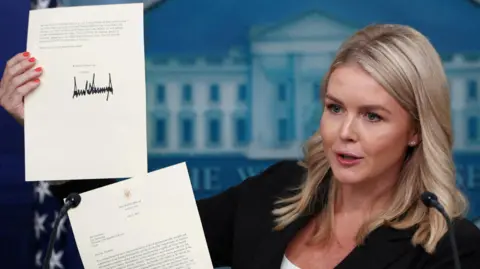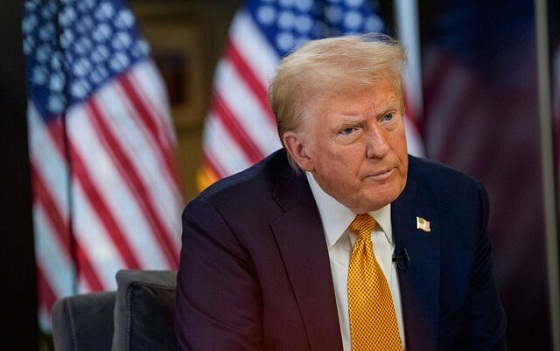President Donald Trump has officially delayed imposing higher tariffs on US imports, while sending letters to 14 countries including Japan and South Korea detailing the levies they face.
The latest development comes as a 90-day pause the White House placed on some of its most aggressive import taxes was set to expire this week.
The president renewed his threat of a 25% tax on products entering the country from Japan and South Korea and shared a batch of other letters to world leaders warning of levies from 1 August.
Higher tariffs had been set to come into effect on 9 July, having previously been suspended with White House officials saying they would look to strike trade deals.
When asked by a reporter whether the new August date was a hard deadline, Trump said: "I would say firm, but not 100% firm. If they call up and they say we'd like to do something a different way, we're going to be open to that."
Economist Adam Ahmad Samdin from research firm Oxford Economics told the BBC that the extension came as no surprise since trade agreements often take years to finalise.
"Such deals are usually extremely detailed," he said, adding that although Vietnam became only the second country after the UK to strike an agreement with the US, it was more of a "broad framework" speeding up talks, rather than a full deal.
Also on Monday, Trump shared letters sent addressed to leaders of 14 countries on social media, informing them of his latest tariff plans, while adding that the rates could be modified "upward or downward, depending on our relationship with your country".
Most of the tariff rates in the letters were similar to those outlined in April when he made his "Liberation Day" announcement, threatening a wave of new taxes on goods from various countries.
The comments suggested Trump would be open to further trade talks, investment strategist Vasu Menon from OCBC bank said.
"The expectations that Trump is once again engaged in a negotiating tactic, rather than making serious tariff threats, offer hope to investors," Mr Menon said.
Trump argues that introducing tariffs will protect American businesses from foreign competition and also boost domestic manufacturing and jobs.
But economists say the measures will raise prices in the US and reduce trade. The three main share indexes in the US slipped on Monday, with Toyota's US-listed shares down 4%.
Japan sent more than $148bn (£108.6bn) in goods to the US last year, making it America's fifth biggest supplier of imports, after the European Union (EU), Mexico, China and Canada, according to US trade data. South Korea was also in the top 10.

Besides South Korea and Japan, Trump on Monday set out plans for a 40% tariff on goods from Myanmar and Laos, a 36% tariff on goods from Thailand and Cambodia, a 35% tariff on goods from Serbia and Bangladesh, a 32% tariff on Indonesia, a 30% tariff on goods from South Africa and a 25% tariff on goods from Malaysia and Tunisia.





